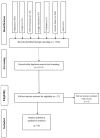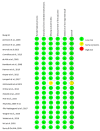Pharmacological Modulation of Temporal Discounting: A Systematic Review
- PMID: 37046974
- PMCID: PMC10093895
- DOI: 10.3390/healthcare11071046
Pharmacological Modulation of Temporal Discounting: A Systematic Review
Abstract
Temporal discounting is a phenomenon where a reward loses its value as a function of time (e.g., a reward is more valuable immediately than when it delays in time). This is a type of intertemporal decision-making that has an association with impulsivity and self-control. Many pathologies exhibit higher discounting rates, meaning they discount more the values of rewards, such as addictive behaviors, bipolar disorder, attention-deficit/hyperactivity disorders, social anxiety disorders, and major depressive disorder, among others; thus, many studies look for the mechanism and neuromodulators of these decisions. This systematic review aims to investigate the association between pharmacological administration and changes in temporal discounting. A search was conducted in PubMed, Scopus, Web of Science, Science Direct and Cochrane. We used the PICO strategy: healthy humans (P-Participants) that received a pharmacological administration (I-Intervention) and the absence of a pharmacological administration or placebo (C-Comparison) to analyze the relationship between the pharmacological administration and the temporal discounting (O-outcome). Nineteen studies fulfilled the inclusion criteria. The most important findings were the involvement of dopamine modulation in a U-shape for choosing the delayed outcome (metoclopradime, haloperidol, and amisulpride). Furthermore, administration of tolcapone and high doses of d-amphetamine produced a preference for the delayed option. There was a time-dependent hydrocortisone effect in the preference for the immediate reward. Thus, it can be concluded that dopamine is a crucial modulator for temporal discounting, especially the D2 receptor, and cortisol also has an important time-dependent role in this type of decision. One of the limitations of this systematic review is the heterogeneity of the drugs used to assess the effect of temporal discounting.
Keywords: decision-making; drug administration; impulsivity; intertemporal decisions; self-control; temporal discounting.
Conflict of interest statement
The authors have no conflict of interest to declare.
Figures



References
-
- Haushofer J., Jain P., Musau A., Ndetei D. Stress May Increase Choice of Sooner Outcomes, But Not Temporal Discounting. J. Econ. Behav. Organ. 2021;183:377–396. doi: 10.1016/j.jebo.2020.12.024. - DOI
Publication types
LinkOut - more resources
Full Text Sources

